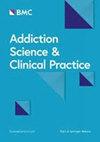Internet-delivered therapy for alcohol misuse: engagement, satisfaction, and outcomes when patients select their preference for therapist- or self-guided treatment
IF 3.7
2区 医学
Q1 SUBSTANCE ABUSE
引用次数: 0
Abstract
Alcohol misuse is common and causes substantial harm. Internet-delivered cognitive behaviour therapy (ICBT) is effective in reducing alcohol misuse; however, the literature investigating how treatment outcomes are impacted by patients’ preferences for therapist- versus self-guided ICBT for alcohol misuse is sparse. In this preference trial, 74 eligible patients (who reported ≥ 14 drinks in the previous week and obtained scores suggesting hazardous or harmful drinking) chose between enrolling in either therapist- or self-guided ICBT for alcohol misuse. We investigated whether those who chose therapist- versus self-guided ICBT differed in their (a) drinking outcomes—as measured by Timeline Follow-Back (TLFB) and heavy drinking days (HDD) at post-treatment and 3-month follow-up—and (b) post-treatment ICBT engagement and satisfaction. The majority (81.1%) of eligible patients chose therapist-guided ICBT. These patients reported higher psychotropic medication use, drinking difficulties, and anxiety symptoms. For both the therapist- and self-guided patients, a modified intention-to-treat analysis revealed large within-group treatment effects for TLFB (β = − 2.64, SE 0.66; p < 0.001) and HDD (β = − 0.34, SE 0.07; p < 0.001), with large pre-to-post-treatment Cohen’s effect sizes of d = 0.97 (95% CI [0.49, 1.45]) for TLFB and d = 1.19 (95% CI [0.69, 1.68]) for HDD. The interaction comparing the effects of therapist- to self-guided ICBT over time was not significant for TLFB (p = 0.34) or HDD (p = 0.06). With treatment, for both therapist- and self-guided patients, there was a significant improvement in drinking difficulties, cravings, and confidence with controlling cravings, as well as in anxiety, depression, and functional impairment. Further, the majority (75.7%) of patients completed five or more lessons, as well as reported overall satisfaction with the treatment (88.9%) and increased confidence in managing their symptoms (86.7%); these outcomes also did not differ between therapist- and self-guided patients. The current study shows that ICBT for alcohol misuse is associated with reduced drinking and comorbid mental health difficulties over time, irrespective of whether patients chose to complete the course on their own or with therapist guidance. Trial registration number: NCT04611854 ( https://clinicaltrials.gov/ct2/show/NCT04611854 ).互联网提供的酒精滥用治疗:患者选择治疗师或自我指导治疗时的参与度、满意度和结果
酒精滥用很常见,并造成了巨大的伤害。互联网提供的认知行为疗法(ICBT)能有效减少酒精滥用;然而,研究患者对治疗师指导的 ICBT 和自我指导的 ICBT 的偏好如何影响治疗效果的文献却很少。在这项偏好试验中,74 名符合条件的患者(报告在上周饮酒次数≥ 14 次,且得分表明存在危险或有害饮酒)选择参加治疗师或自我指导的 ICBT 治疗酒精滥用。我们研究了选择治疗师或自我指导 ICBT 的患者在以下方面是否存在差异:(a)饮酒结果--以治疗后和 3 个月随访时的时间线随访(TLFB)和大量饮酒天数(HDD)来衡量;(b)治疗后 ICBT 的参与度和满意度。大多数符合条件的患者(81.1%)选择了治疗师指导的 ICBT。这些患者报告了较高的精神药物使用率、饮酒困难和焦虑症状。对于治疗师指导和自我指导的患者,修改后的意向治疗分析显示,TLFB(β = - 2.64,SE 0.66;P < 0.001) 和 HDD (β = - 0.34, SE 0.07; p < 0.001),治疗前与治疗后的科恩效应大小分别为 TLFB 的 d = 0.97 (95% CI [0.49, 1.45])和 HDD 的 d = 1.19 (95% CI [0.69, 1.68])。治疗师指导的 ICBT 与自我指导的 ICBT 随时间变化的交互作用对 TLFB(p = 0.34)或 HDD(p = 0.06)的影响不显著。通过治疗,治疗师和自我指导的患者在饮酒困难、渴求、控制渴求的信心以及焦虑、抑郁和功能障碍方面都有显著改善。此外,大多数患者(75.7%)完成了五节或五节以上的课程,并对治疗表示总体满意(88.9%),对控制症状的信心也有所增强(86.7%);这些结果在治疗师指导和自我指导的患者之间也没有差异。目前的研究表明,无论患者选择自行完成课程还是在治疗师的指导下完成课程,ICBT 治疗酒精滥用与长期减少饮酒和合并心理健康困难有关。试验注册号NCT04611854 ( https://clinicaltrials.gov/ct2/show/NCT04611854 ).
本文章由计算机程序翻译,如有差异,请以英文原文为准。
求助全文
约1分钟内获得全文
求助全文
来源期刊

Addiction Science & Clinical Practice
Psychology-Clinical Psychology
CiteScore
3.90
自引率
10.80%
发文量
64
审稿时长
28 weeks
期刊介绍:
Addiction Science & Clinical Practice provides a forum for clinically relevant research and perspectives that contribute to improving the quality of care for people with unhealthy alcohol, tobacco, or other drug use and addictive behaviours across a spectrum of clinical settings.
Addiction Science & Clinical Practice accepts articles of clinical relevance related to the prevention and treatment of unhealthy alcohol, tobacco, and other drug use across the spectrum of clinical settings. Topics of interest address issues related to the following: the spectrum of unhealthy use of alcohol, tobacco, and other drugs among the range of affected persons (e.g., not limited by age, race/ethnicity, gender, or sexual orientation); the array of clinical prevention and treatment practices (from health messages, to identification and early intervention, to more extensive interventions including counseling and pharmacotherapy and other management strategies); and identification and management of medical, psychiatric, social, and other health consequences of substance use.
Addiction Science & Clinical Practice is particularly interested in articles that address how to improve the quality of care for people with unhealthy substance use and related conditions as described in the (US) Institute of Medicine report, Improving the Quality of Healthcare for Mental Health and Substance Use Conditions (Washington, DC: National Academies Press, 2006). Such articles address the quality of care and of health services. Although the journal also welcomes submissions that address these conditions in addiction speciality-treatment settings, the journal is particularly interested in including articles that address unhealthy use outside these settings, including experience with novel models of care and outcomes, and outcomes of research-practice collaborations.
Although Addiction Science & Clinical Practice is generally not an outlet for basic science research, we will accept basic science research manuscripts that have clearly described potential clinical relevance and are accessible to audiences outside a narrow laboratory research field.
 求助内容:
求助内容: 应助结果提醒方式:
应助结果提醒方式:


